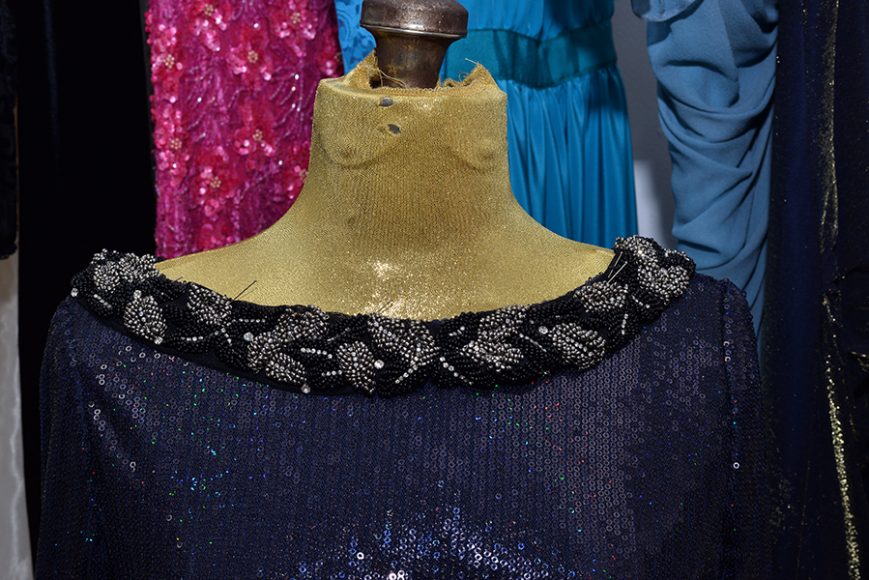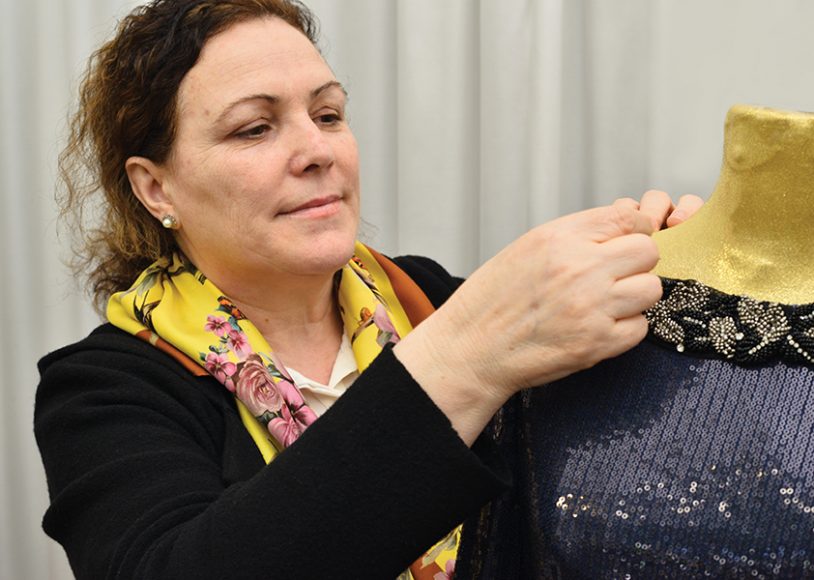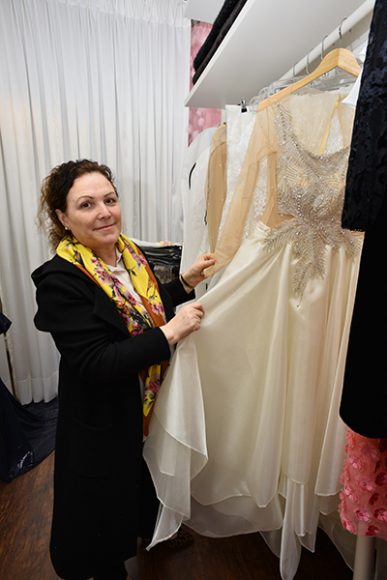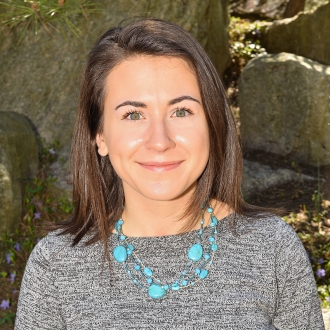There is an evening gown that adorns a mannequin near the front of Geraldina’s Couture, the dress and alteration shop in Hartsdale.
The long, blue-sequined dress with bustled sleeves and an ornate collar was custom-made by the store’s owner, Geraldina Shabani, with a specific client in mind.
While the client gushed over the eye-catching dress during an initial fitting, Shabani knew she could do better. So she created a second gown — similar, but more suited to the client’s silhouette.
The client, of course, loved the second dress even more.
Shabani, a native of Albania, opened her store at 12 E. Hartsdale Ave. in March last year. Drawing on her years of experience, it specializes in everything from customized bridal gowns to alterations and restoration of vintage pieces.
“I create from nothing, I make something,” Shabani says.
The seamstress exudes a quiet pride as she walks around her Hartsdale shop, pulling fabrics and sharing the stories behind each dress. One diamond-covered dress was handmade for a pregnant bride who could not afford the designer gown of her dreams. That bride would go on to call Shabani her “fairy godmother.”
Another is simply bunched-up lace Shabani placed on a child-sized mannequin to showcase a floral belt. She is now rushing to recreate that “dress” to meet the demands of brides-to-be who’ve entered her store.
For Shabani, the Westchester storefront is the realization of a decades-long dream, one that has made the journey with her halfway across the globe.
Having grown up in a family of tailors and seamstresses, Shabani fell in love with fashion and design at a young age, creating her first dress when she was 10. At 18, she managed a full staff at her uncle’s fabric business in Albania.
But the Albanian civil war in the late 1990s led Shabani and her husband, Arjan, to flee the country with their 13-month-old son, Redi, and move to Greece.
“People lost their jobs, and it was not quiet anymore,” she says. “We saw no future there. We felt we are doing the right thing” by moving.
Though the couple had family in Greece, Shabani found it difficult to find work in her new country. Much of the employment was seasonal and many business owners were hesitant to hire a woman with a young child. “I would go there with my son in my arm and they would say no.”
To find work, Shabani made the difficult decision to return her son to Albania so he could stay with family while she worked in Greece. That decision would prove a turning point for Shabani, who was then unable to gain the required documentation to return to Albania to be with her son.
“It took me 5 ½ years” to reunite with her son, she says, emotion creeping into her voice. “My son didn’t know me. I promised I would never leave him again.”
She was able to find work as a seamstress in an interior design store, a job she kept until, she says, “I got lucky.”
In 2010, Shabani was selected as a winner of a Green Card lottery and made the decision to come to America, along with her son and husband, in search of a better life.
“I had no second thoughts in my mind,” she says. “I had to take this opportunity for my son and maybe for me.”
Speaking to family and friends in her home country, Shabani learned about the fashion mecca in Manhattan. She was able to find an apartment in Poughkeepsie and wasted no time looking for work.
“The next day, my son found a job for me on Craigslist.” Just two days after arriving in New York, Shabani and Redi took the train to New York City for an interview with design label Peggy Jennings.
Because she spoke no English, 13-year-old Redi served as his mother’s translator.
“They took me to the showroom and they asked my son, ‘What does your mom know to do here?’ and I say, ‘I know everything,’” she recalls with a smile. “So they says, ‘Show us what you know.’ So I took a dress they gave me (to alter) and in two hours, I was done.” Shabani was offered the job on the spot and began working the following day.
From there, she worked for a number of high-end designers, from Christian Dior to Dolce & Gabbana to Fendi. “But always I was looking for more.”
Shabani treated her long rides from Poughkeepsie to Manhattan as classes in the English language. “Commuting daily, I was trying to listen to people on the train,” she says. “They were talking and sometimes I felt bad because they feel like I’m nosey.”
She recalls sitting near a group of teachers as they were heading into the city, chatting excitedly about their plans for the day.
“I was sitting across (from them) and I was watching. They would catch my eye looking at them and I say, ‘I’m so sorry, I’m just trying to hear how you make the pronunciation. I want to learn English,’” she says. “They say, ‘Of course,’ and they bring me into their conversation and start teaching me.”
Other commuters would help Shabani with text messages she was hoping to send or teach her correct verb usage.
“I came here with no English at all and I had to make it,” she says. “So I tried to learn English first, so I can show my best side.”
Redi also played a large role in ensuring his mother would learn her new country’s language. “He would prepare every day a dictionary for me, and I would have to read when I commuted on the train,” she says. “At night, he would ask me if I know them.”
Though working in the bustling city was exciting, Shabani felt her work lacked the creativity she so desperately hoped to share. “Working for the big brands was very stressful,” she says. “There was not room enough for me to show my skills.”
During that time, Shabani also did alterations for friends and acquaintances from her home in Poughkeepsie. When a client, a woman she met through another chance encounter on the train, persuaded her to visit Hartsdale, Shabani fell in love.
“I looked at this location and said, ‘This will be my future,’” Shabani says of Hartsdale, the hamlet in Greenburgh to which she and her family moved in 2014.
During her many walks along Hartsdale Avenue, a vacant storefront caught her eye, evoking visions of a store of her own. “I said, ‘Stay there, wait for me,’” she recalls, laughing.
Those dreams became reality last year, when Shabani was finally able to open her own shop in that same storefront.
“One day I say, ‘I have to take a risk and try before it’s too late.’”
Redi, now a student at SUNY Stony Brook, was again by his mother’s side, programming her website, helping with social media and creating her store logo.
“I feel so proud,” Shabani says of her son.
Shabani continues to work on her grasp of the English language and, while she has a permanent resident card, is preparing for a U.S. citizenship. She also takes classes with the Women’s Enterprise Development Center, the White Plains nonprofit that assists women entrepreneurs in building their businesses.
“This was very helpful (for learning how) to be an American businesswoman,” she says. “I’m learning a lot. I want to give my heart to my business.”
Shabani hopes to put her skills to use in Geraldina’s Couture, both on her business’ back end and with a needle and thread, if for no other reason than for her son.
“He has grown up taking care of me, translating for me,” she says. “For him, I came here. I promise to him I will make him proud.”
For more, visit geraldinascouture.com.







